September 8, 2023 — Forty-five years after selecting its first six women to fly into space, NASA has 16 active female astronauts who are eligible to become the first woman to walk on the moon.
For Loren Grush, the best thing about this new group of trailblazers, is that like the original six, they neither have nor need "the right stuff" — at least as the term was applied to their male counterparts from 60 years ago.
"What I love about the six is that there was no 'right stuff.' They were all a very diverse bunch in terms of their backgrounds and their histories," said Grush in an interview with collectSPACE. "There were two medical doctors, a chemist, an electrical engineer, an astrophysicist and tennis player and an oceanographer and geologist. They are very illustrative of the fact that there is no clear path to space."
Or, for that the matter, the moon.
In "The Six: The Untold Story of America's First Women Astronauts," Grush devotes her first book to chronicling the lives and adventures of Anna Fisher, Rhea Seddon, Shannon Lucid, Judy Resnik, Sally Ride and Kathy Sullivan, who in 1978 joined NASA's first group of astronauts to include women and minorities. A space reporter for Bloomberg, Grush explores not only the ins and outs of each woman's biography, but what they faced together as the "Six" in what was — and to some degree, still remains — a male-dominated profession.
collectSPACE spoke with Grush about her opinion of the six and what there is to be learned from their experiences as NASA considers narrowing its current sixteen to the one — the first woman to step foot on the lunar surface.
collectSPACE (cS): You write in "The Six" about the process — or perhaps, more appropriately, the lack thereof — by which NASA chose the first American woman to fly into space. Why was Sally Ride selected to be the first?
Loren Grush: That was an eye opening thing to learn about in my research. I thought there was going to be some kind of rigorous objective or initiative to select the astronaut, but really, it just came down to [director of flight operations] George Abbey's selection.
Now, he did talk to Bob Crippen, who was the commander of STS-7 (the 1983 space shuttle mission to which Ride would be assigned] and to get his opinion, but ultimately I think it was just that Abbey thought Sally was the right person for the particular mission requirements — or at least that's what he said to me.
This particular mission was going to be very heavily focused on the robotic arm and Sally was renowned for her robotic arm expertise at the time. But of course, that wasn't the only reason.
I think they also knew that the person who was going to be selected as the first American woman to go into space was going to have to deal with quite a lot of pressure. Based on Sally's experience and the way she worked at NASA, they thought that she would be able to handle it the best. I think her background as a [nationally-ranked] tennis player was a factor too, in that that was something Abbey brought up to me as well. He thought her ability to keep cool on the tennis court also played a role into why she was selected.
cS: Based on everything you know about the six, who would you have chosen to be the one?
Grush: I don't want that pressure! (laughs)
I think they all could have been fantastic at it and they would have each brought something unique to the table.
Some of them were much more adept at handling the press than others, whereas others were so eager to talk. I think Sally didn't particularly enjoy having to answer the questions that the press threw out to her.
But I don't necessarily think that was something that the first American woman needed, but it would have just been different depending on who was selected. Sally was a great first choice, but in my opinion, any one of the six would have been a great first choice as well.
cS: Today, when we look back, most of the attention is paid to Sally because she was the first. But who among the six achieved the most as an astronaut?
Grush: Shannon Lucid is definitely one of my favorite to talk about.
She came into the program a little bit older than the rest of the women and so her background was very different in terms of the kinds of sexism and chauvinism she experienced before she came to the space program. She very much just wanted to work before she became an astronaut and finding a job was very difficult for her because people would actively tell her that there was no way she was going to get hired as a woman. And if she was hired, she was definitely not deserving of equal pay with her male colleagues.
She was also one of the women who had dreamed of being an astronaut her whole life. And then ultimately, she was the one to go sixth. But she would also go on to have this extremely storied career at NASA. She famously stayed on board the Russian Mir space station for a very long time and broke the record when she came home as having the most cumulative time in space by a woman and an American.
cS: Who among the six is the most overlooked today?
Grush: The first few to fly are remembered, especially Kathy for being the first American woman to perform a spacewalk and Anna as the first mother [to fly in space].
We should definitely hoist up Rhea and Shannon, but also Judy sometimes gets overlooked because while a lot of people do know her from being lost aboard [space shuttle] Challenger, a lot of the focus is placed on [teacher] Christa McAuliffe for being on that flight. Not to disrespect McAuliffe, but Judy had a great career before she tragically lost her life. Writing about her first mission to space was really one of the best moments I had writing the book.
cS: Based on your coverage of the current space program, what do you feel the 16 active-status women in NASA's astronaut corps today share in common with the original six?
Grush: They're still breaking barriers. Just a few years ago, we had the first all-female spacewalk with Christina Koch and Jessica Meir. So I think a big commonality that they have with the first woman is that, sadly, we're still very far from reaching total equality in terms of who we send to space. We're still breaking barriers with some of the things that women can do when they go to space.
cS: And the flip side of that question: how do they differ?
Grush: They have had a long line of women come before them who have helped to pave the way and make being a woman astronaut a much friendlier and easier profession.
One thing I talked about with [first female space shuttle pilot and commander] Eileen Collins for the book is that when she came on board, she had people to turn to to ask questions. She also mentioned that when women got pregnant in the space program, they had other women to turn to to ask, 'Is this appropriate? Am I handling this correctly?'
So I think that's how they differ, but all of them share a desire to simply do their jobs and their jobs just happen to be breaking free of Earth's gravity.
cS: The 16 women in the astronaut office today are facing a new first — the first woman to walk on the moon. Based on what we know of Sally Ride's experience, as well as Neil Armstrong's and the other members of the six, what do you think makes for the ideal candidate for that role in history?
Grush: I think it is clear that whoever is going to be chosen will definitely have to deal with a lot of press, just like Sally. I really hope and I'm very certain that the types of questions that she will be asked will be far more enlightened.
Famously, Sally was asked if she wept in the simulator whenever it went down. I don't think the first woman to walk on the moon will have to deal with that kind of questioning, but she will be receiving a lot of attention. So it's going to be somebody who wants to to be able to speak with the public and share their story. I think everyone in the astronaut corps at this time is pretty superb at that so I don't think they can go wrong with picking the first woman to walk on the moon.
cS: NASA, working under the direction of the prior and current administrations, has stated clearly that it is a requirement that the first Artemis mission to return humans to the moon's surface include a woman on the landing crew. Because of that, do you think that woman needs to have a certain degree of femininity?
Grush: That's a great thing about how we've evolved in terms of where we were when the six were chosen and where we are today. Being a woman today is really about what it means for you as the woman and so ultimately it is up to her if she is perceived as feminine. She should be as comfortable in her skin as possible. I think that's ultimately what's going to be inspiring for everyone. It's just somebody who is very comfortable with the type of woman that they are.
cS: When we do return to the moon, would you like to see the first woman to fly or land there, pay some type of tribute to the six? What do you think would make for a good way to do that? Maybe take a copy of "The Six" to the lunar surface?
Grush: You took the words right out of my mouth. (laughs)
I think recognizing the women who came before would be a beautiful tribute, but not even just the women who have flown but all the women who've been a part of the space program in general. For every one astronaut that goes to space, there are 50 to hundreds of engineers who have worked to get them there.
Over time, it hasn't just been a male dominated industry for the astronaut corps. It's also been male dominated behind the scenes as well. So I think honoring all of the women in the space program would be a beautiful tribute. |
|
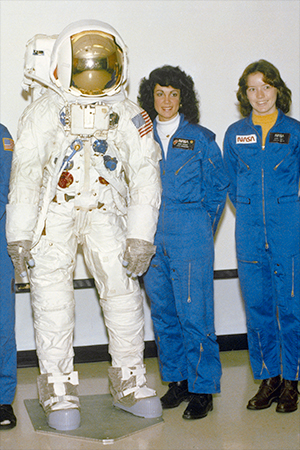
America's first women astronauts, including Shannon Lucid, Rhea Seddon, Kathy Sullivan, Judy Resnik, Anna Fisher and Sally Ride, pose with an Apollo A7L/B moon suit in 1979. (NASA)
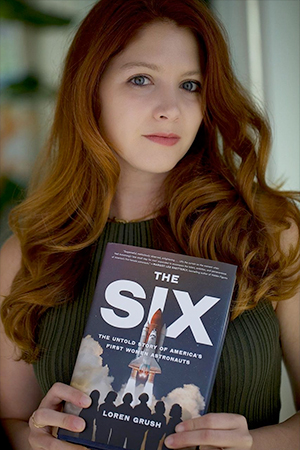
Space reporter Loren Grush holds a copy of her book, "The Six: The Untold Story of America's First Women Astronauts" as set for release by Scribner on Sept. 12, 2023. (Loren Grush)
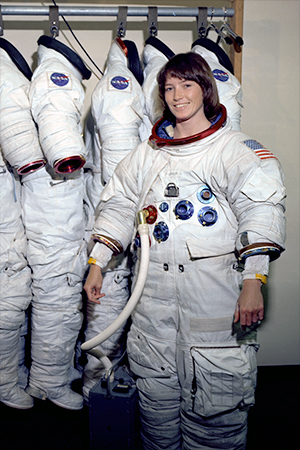
Anna Fisher, one of 'the six' first U.S. female astronauts selected in 1978, wears and stand before a rack of Apollo moon suits. (NASA)
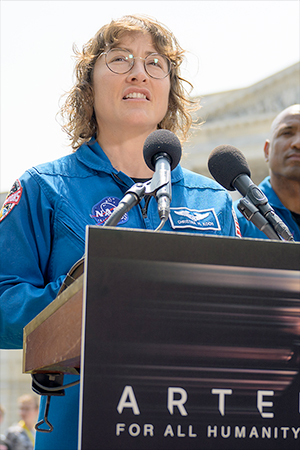
NASA astronaut Christina Koch, who as an Artemis II mission specialist will be the first woman to fly around the moon, joins her crewmates to answer questions from the press. (NASA/Bill Ingalls)
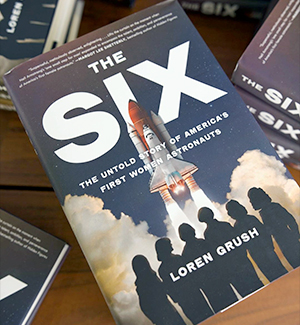
"The Six: The Untold Story of America's First Women Astronauts" by Loren Grush is being released on Sept. 12, 2023. (Loren Grush) |
